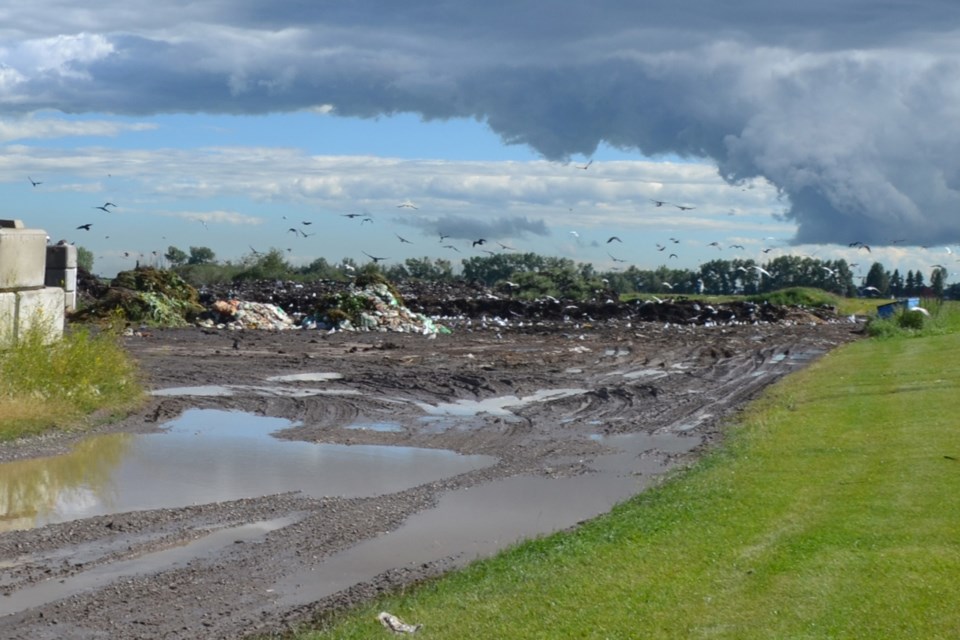OLDS — Olds College officials say they can’t get rid of active composting operations and curing material on campus right now, but the goal is to end the “active composting phase” by this June and have all material on-site gone by or before this December.
Local resident Doreen Mousek, who was among those who raised smell and health concerns in connection with the composting site last summer, is hopeful the college will be able to meet those goals.
But she remains skeptical.
“I guess December’s a long time and I don’t know how it’s going to smell,” she said during an interview.
Last summer, Mousek, who lives about a kilometre away from the site, complained about odours emanating from the site.
She also complained of having a burning throat and the dead flies on her deck. She suspected both issues could be related to operation of the composting facility.
Other residents raised similar concerns as well, including the fact that birds were attracted to it and appeared to spread garbage around the area.
In the wake of those concerns, the college held a virtual discussion on the problem in early September.
College officials announced that due to the concerns raised by local residents combined with the proximity of the site to the college, it was no longer considered suitable to operate the site as commercial compost facility.
And as a notice on the Olds College website says, it was “no longer in alignment with the college’s academic and research priorities.”
So college officials created a plan to transition the site to a non-commercial compost centre by the end of last year.
As part of that plan, all intake of fresh material ended in November, and finished compost, along with the tenant’s equipment, was removed from the site.
The college officially took over operation of the compost centre on Dec. 1, 2020, one month earlier than planned, as the website noted.
The college held a virtual town hall on March 16 to update participants on the transition plan for the composting facility.
"Due to legal and logistical reasons, actively composting and curing material was not able to be removed from the site."
"Legally, Olds College cannot transport actively composting materials to any non-permitted composting site (other than a landfill). There are no permitted composting facilities in the area with capacity to take the remaining materials," Patrick Machacek, vice-president of development & strategy for Olds College, wrote in an email.
"Logistically, the cost to transport all of the remaining material to the landfill was prohibitive and not the best environmental choice, so the college decided to keep the actively composting and curing material on-site and oversee the rest of the process," he added.
A news release issued after the event says while the active composting continues, college officials are the working with contract equipment operators to manage it.
“The college will be actively managing the composting material throughout the spring to promote good composting conditions that will minimize odour and pest issues,” the release says.
“This means adding carbon (straw bales) and turning (aeration) of the windrows to promote aerobic degradation of the material. These activities have already begun and will ramp up over the next few weeks.
“There may be some odour generation as the material is moved around and windrows reformed over the next few weeks, but this will help minimize odour issues over the longer term.
The release also says “college staff (are) overseeing the activities and remaining engaged in overall monitoring of the composting process.”
“This includes temperature monitoring, sampling of the material to optimize carbon and moisture content, and assessing the quality of the finished product.”
"The only way to completely eliminate odour and bird issues is to completely remove all of the material, which wasn't possible, due to legal and logistical constraints," Machacek wrote.
It's anticipated the active composting phase will be completed by this June. At that time, all of the compost material on site will be put into curing piles for three to four months.
Assuming the goal to have all material currently on-site removed by or before this December is met, the college is considering using the site to manage on-campus waste or “to support applied research and teaching/learning activities related to waste management.”
Operation of the composting facility dates back to 1994 when a development permit was issued for it for education and research purposes. An addition was approved in 2001.
A few years ago, Stoney Soil Products was brought in to operate it.
Mousek said in her mind, trust of the college has been broken because it entered into the deal to have Stony Soil Products undertake composting on the facility without – as far as she knows – letting the public know about that.
She said her health concerns still continue.
“And like really, if I had a student there, I’d be wondering about the health concerns (regarding) the student,” she said.
Machacek says plans call for a follow-up town hall community meeting regarding the compost centre to be held in June.
“Olds College is committed to being a good neighbour and appreciates feedback on all our campus programs and applied research initiatives,” the release says.
The college was asked if it can assure residents that it will never allow another large scale composting operation to be undertaken on college land -- commercial or otherwise.
"Residents can be assured that Olds College will only use the compost centre for private, non-commercial composting that supports college academic and research prioritites," Machacek wrote.
Anyone who has any questions or concerns about the compost site is urged to contact the Olds College Centre for Innovation (OCCI) at [email protected] or call 403-507-7970.



